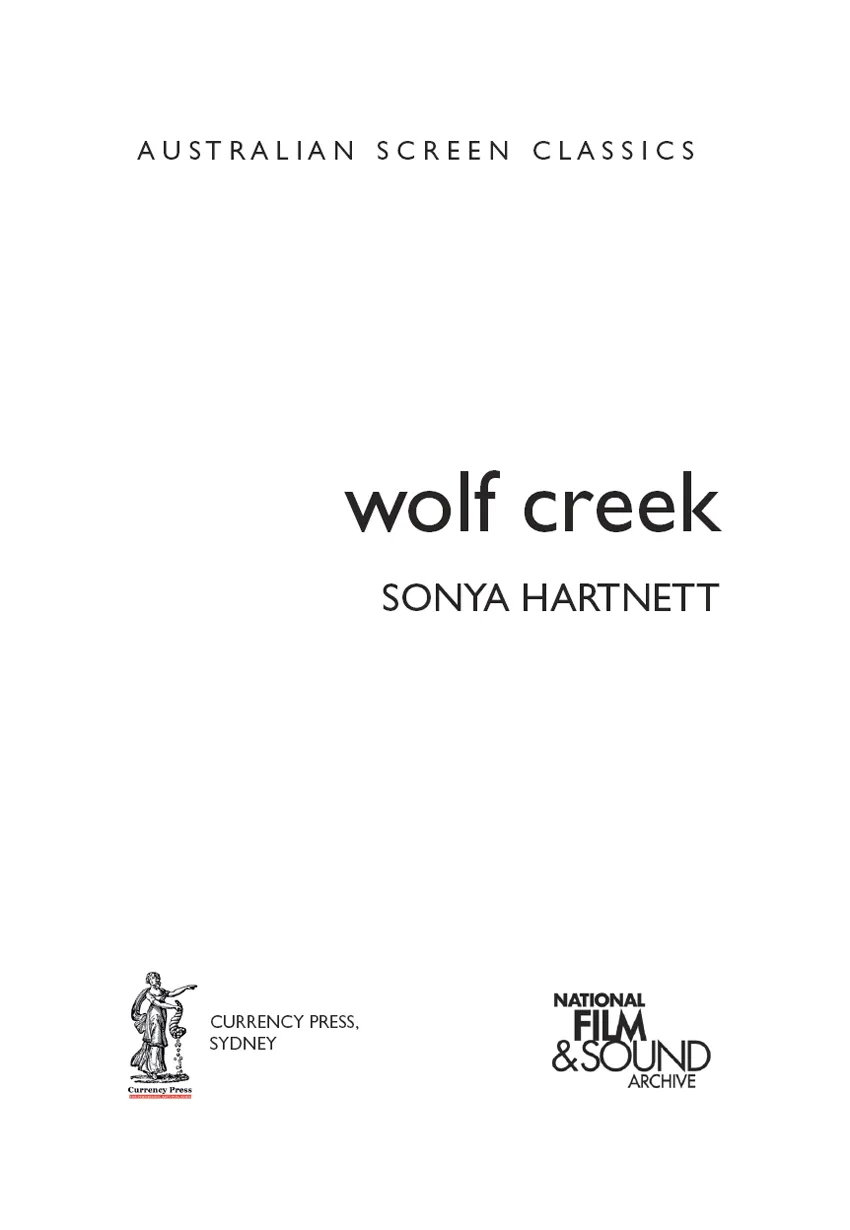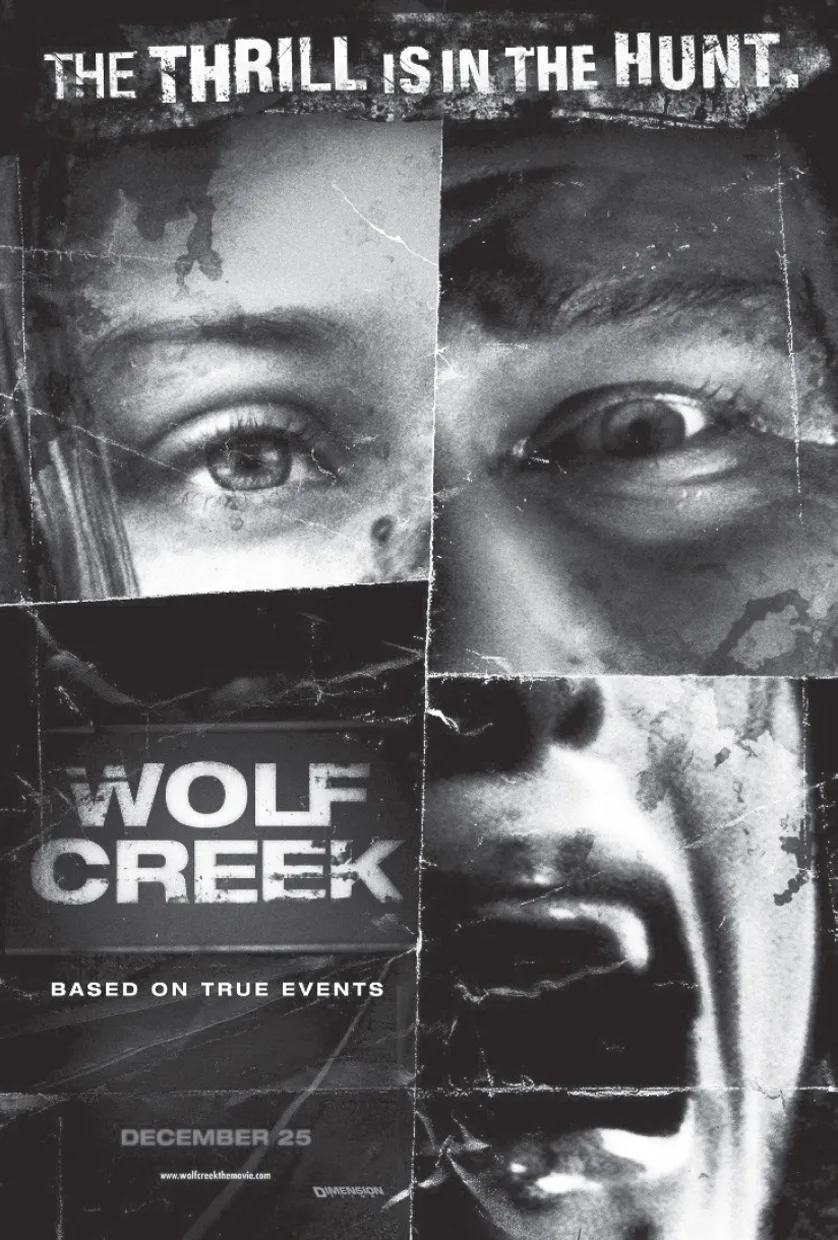![]()
![]()
I
I first saw it when it came out at the cinema, but I’d been thinking about Wolf Creek for years.
When I was eight years old my mother took my brothers and sisters and myself to a farm in Gippsland for a holiday. It was a working farm but, presumably to make some extra income, it took in tourists and stashed them in one of several on-site vans which stood in a clearing close to the farmhouse. I remember lying on my back on one of our van’s thin mattresses, reading Enid Blyton and realising, as I did so, what books were for. They were for taking you away from wherever you were. The caravan-farm was a good place to leave.
We never had much money, and the holidays of my childhood weren’t grand. They never involved hotels or aeroplanes, but were passed close to the dirt in places my mother had driven to in one of various clapped-out vehicles. Almost always we left our father behind, backing the car down the drive in the earliest hours, not exactly escaping—an early start made the most of the day—but leaving furtively enough to make it feel like escape. This time, however, my father followed us, turning up unannounced at the caravan door one afternoon. His presence was oppressive, just a twitch away from actually frightening. It only added to the atmosphere.
The farm was filthy. Not far from the caravans, a dead cow rocked on its bloated torso. Farm dogs rushed the strangers, their chains lashing the dust. The farmer, a loud man, encouraged the caravan children to chase the chickens. When one was finally cornered, the farmer put it on the block and chopped its head off. I can still hear the thock as the hatchet fell, still see the headless bird running. The farmer hadn’t told us the game would end like that.
Walking the paddocks, my sisters were electrocuted crawling under a warningless fence. I remember their screams flying into the air and vanishing. I did not immediately understand what was happening to them. It seemed as if the land itself, where they touched it with their palms and knees, was tearing them to pieces inside.
I have never known a time or a place so steeped in wrongness as that farm. I lay day after ugly day on that mattress aware of my untrustworthy father, my seething mother, the hot air gusting, the dogs barking, the festering carcass, the squalling children, the metal walls of the caravan creaking with heat. I climbed the Faraway Tree with all the concentration I had.
There is a photograph taken by me from that time—the first photograph I ever took. To one side is my baby brother, but he is not the focus. Rather, my eye was on a pile of black pups which lay noodlishly entwined, asleep in the shade of a caravan. I was a child used to making the best of a situation. These pups, on that farm, were my sole good thing. And one day the farmer announced that that night there would be a fancy dress competition and that the winner would receive, as a prize, one of the pups.
We had not, of course, come prepared for such events, and had nothing from which to make costumes. I remember the distress that sang in me as the afternoon slithered by. I had no costume, I would not win; my mother was unmoved. She had five children and a difficult husband: she did not want a pup. She never seemed to understand that, because there were five children and a difficult husband, a pup was what I craved. I struggled to piece together an outfit that would impress the farmer while going unnoticed by my mother, but in our pillowcases of clothes there were no ribbons, no paint, no high-heeled shoes. I cobbled together a pathetic something but I knew I wouldn’t win. I knew conditions were such that I was neither destined nor permitted to win. Nonetheless I remember stepping out with that hopefulness to which a child can cling even in the face of absolute defeat. Maybe somehow, miraculously, the entire world would change.
I don’t think the farmer looked twice at me. The rabble of caravan children were arranged in a circle around the bonfire and the farmer walked the perimeter, the pup in his arms. When he came to me, I looked at the pup. I recognised it. I wanted to win. But it was not my hair which was ruffled by a rough hand, not my face which was raised to a skeleton-rattle of applause. When the farmer hoisted the pup by the scruff, it wasn’t my name he called. I didn’t get the dog: yet on that night, something did change.
I was wearing an outfit of rags, surrounded by children dressed likewise. The sky was unbrokenly black. The flames of a pyre-like bonfire kicked and swiped at the night. Its heat lit our faces in strange ways. There was music coming from a tinny cassette player, and dogs were ceaselessly barking. The smell was of smoke and meat. The farmer stood like a ringmaster, shouting, hotly enjoying each moment. He was in command. This world was his—he knew it, he owned it, it lived and died as he desired. The terrible dogs would jump to his word. He had brought us here, told us how we must behave. The fire was his, he’d built it, he could consign anything he wished to the flames. We children were staring to him, all our eager unsure faces, intent upon his every word. Our faith and our dreams lay with him. He raised the pup like a sacrifice to the moon; dogs howled, the air stunk, stinging sparks blew. The adults laughed and grimaced, even my own fearsome father small before him. For minute after minute it was mesmerising: I’d never forget the cartwheeling feeling of derangement, how the earth and the animals and the elements seemed to conspire with the dust-covered man to humble and mock and render helpless his audience who were not, as he jocularly pretended, his friends, but his hated audience, his prey. It would be years before I’d recognise what I was seeing, how the fire, the darkness, the burned dirt, the baying hounds were all characters playing, pitch-perfectly, their role; years before I realised that the poverty, filth and fear were vital, the stage incompletely set without them. Yet some awareness did sink through me even as I stood in my failure of a costume, weeping the loss of a dog I never owned. This red-stained diorama, this small nightmare, this rank carnival of wretchedness spoke to me. It told me there was power and weakness in the world, sanity that masked insanity, kindness which concealed rage. It was no ground-breaking discovery, yet it felt like finding a key. Understanding was like the donning of armour.
I have spent my life writing about that night, reworking and rewording it, transforming the setting from country to suburb, crossing ocean and centuries. I have shape-shifted the characters from boys to teenagers to cats to old women, dosing each with their required fill of cruelty or innocence. The style I’ve pursued could be called Australian Gothic, and its tastes run parallel to those of its grim Southern cousin: but the description is not a perfect fit. It wants to be called something simpler, reflective of the sullen blandness of its heart. Something scornful, to mute the arrogance. Something like two-bit antipodean horror.
And so to Wolf Creek.
![]()
II
It begins as it may, with a declaration in white type on a black screen:
The following is based on actual events.
30, 000 people are reported missing in Australia every year.
90% are found within a month.
Some are never seen again.
It is an invitation, an open door. If this is a horror movie, we know what horror movies do. We will see the missing, we’ll see the moment they transform into the missing, we’ll see why they will never be found. They, of course, won’t see us watching their fate befall them, and this is part of the acknowledged pleasure that a viewer may take from a horror, the thrill of being terrified from a safe distance. When the action is based on fact, however, a hole opens up beneath the film. A horror movie plays to its audience, wanting it to squirm and even chuckle in appalled appreciation of its events. But can a non-psychopathic viewer comfortably chuckle over some agony which was truly inflicted, the loss of a character based on a person who once lived and breathed? And if a horror film doesn’t allow its audience this appreciation which is a most basic promise of the horror, is the film actually part of the genre? Isn’t it simply a movie which depicts something ghastly?
I don’t know; already I’m raving. But Wolf Creek’s tangling of historical facts and cinematic embellishment is interesting and problematic, particularly to its native audience. Australians know so well, after all, the actual events.
One thing we’ll never see is a creek. The film will revel in dust, staining its characters with the ochre of the outback. But it opens on the coast, wide tides of water hauling back from a shore. The dizzying white light of the Australian sun makes the camera swoon. Briefly we see palm trees, a main street which seems empty, a ghost town, intact yet abandoned, the kind of place which will remain after an apocalypse. This is Broome, Western Australia, 1999, the film again insisting on a truth in what we’ll witness. And Australians, as we know the actual events, also know Broome. It’s a pearl town, a hard-working mining town, a rough and sweaty party town and a trinkety tourist town, gritty with sand, awash with drugs and drink. It sits on the high shoulder of Australia’s rugged western coast surrounded by desert and depthless ocean, a place so far from anywhere that it could indeed be crouching at the end of the world.
A young man is inspecting a second-hand car—at $1500 it’s inexpensive, and the price could explain as much about him as do his smattering of tattoos, his sunglasses and shorn hair, his singlet which is a uniform in this corner of the country. Broome can be a tough place, and the young man with the closely-cropped head looks tough. But when the salesman attempts to engage him in blokey conversation—‘Travelling with two sheilas, are you mate? Two, eh? Be a bit of fun, eh? They get—ah—real easy when they travel—loosen up a bit, eh?’—the young man will not be drawn, answering with mumbles and dilute smiles. He won’t resp...



